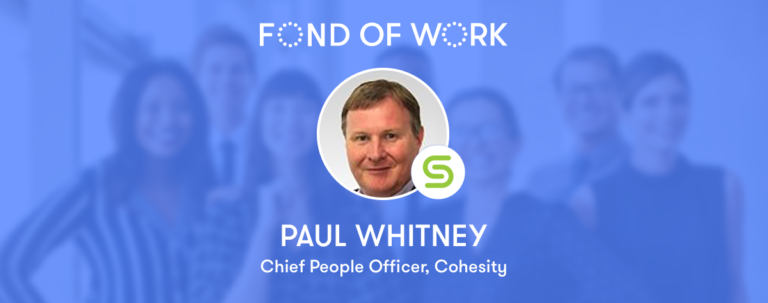
This time for Fond of Work, we spoke with Paul Whitney, Chief People Officer at Cohesity. Cohesity is a data management platform that eliminates mass data fragmentation problem and radically simplifies the way companies protect, control, and extract value from their data.
Paul is a global HR VP with significant international knowledge. He specializes in the development and implementation of new HR strategies and processes that drive organizational performance.
How did you first get into the HR space?
Actually, this was something that I wanted to do since I was 16 or 17. I chose my university degree to be geared toward HR.
 When I was starting to think about my future, I visited the largest employer in my hometown (where my mother happened to work) and spent a few days shadowing different people. I shadowed the manufacturing director, the marketing director — these were quite senior people in the company (in the UK, a director is equivalent to a VP).
When I was starting to think about my future, I visited the largest employer in my hometown (where my mother happened to work) and spent a few days shadowing different people. I shadowed the manufacturing director, the marketing director — these were quite senior people in the company (in the UK, a director is equivalent to a VP).
I also shadowed the head of HR, and that person had the most interesting meetings. They went from meeting with a trade union official to solving some big employee relations issues to talking about pay. When I was with this person, they touched just about every aspect of the company and I thought, “Wow, that’s a pretty interesting place to be.”
That sparked my interest in HR. I went on to university and did undergrad and postgrad degrees with specialization in HR, and I’ve worked in the profession since graduation.
That’s unique! Many HR leaders I speak with transitioned mid-career into HR rather than working in the field right out of college.
Over the years, I’ve developed a perspective on how strongly I believe in the value of HR in an organization and the good it can do. I’ve equally developed perspective on what really bad HR can be like and how it can give our profession a bad name.
It’s been a great experience. I’ve really enjoyed just about every job in my career. I’m moving towards the tail-end of my career now, but I’ve really enjoyed working in the US (I started my life in the UK), working with startups, doing IPOs — all those kinds of things have been a lot of fun.
How did you end up at Cohesity?
I was working with a company called Nimble Storage that was acquired by Hewlett Packard a few years after our IPO and I did not want to stay with Hewlett Packard. I have no interest in working for very large companies.
 I wasn’t sure what I was going to do but got connected to several companies, mainly through the VC community. I actually ended up at a company called Databricks located in San Francisco. They’re artificial intelligence, high growth — a lot of fun. I worked there for a year but my home was in San Jose, over an hour away. After a year, I decided I didn’t want to have that commute up to the city or live up in San Francisco.
I wasn’t sure what I was going to do but got connected to several companies, mainly through the VC community. I actually ended up at a company called Databricks located in San Francisco. They’re artificial intelligence, high growth — a lot of fun. I worked there for a year but my home was in San Jose, over an hour away. After a year, I decided I didn’t want to have that commute up to the city or live up in San Francisco.
A friend of mine who works at Cohesity said that I should talk to their CEO and Founder. I didn’t think I wanted to go back into storage because I’d come from Nimble and gone to this AI company. It seemed like it might be a step back, from a technology perspective. But this friend told me that Cohesity is not like regular storage. And he was right. It’s not.
So, I met with the CEO, Mohit, and he laid out his vision for what he’s trying to do here at Cohesity. It was really exciting. I met the rest of the leadership team who are a wonderful bunch of people.
For me, there’s a kind of diagnostic I go through when I’m looking at a new company:
 My first question is: does this company solve a problem that I can understand and care about — and that a lot of other people care about? The problems that Cohesity is solving absolutely fit this criteria.
My first question is: does this company solve a problem that I can understand and care about — and that a lot of other people care about? The problems that Cohesity is solving absolutely fit this criteria.
My second question is: does this company have execution capability? Have they raised money? Do they spend it wisely? Have they built product, brought product to market, and supported product? Do they have a strong sales team?
My third question is: do I align with the values and culture of the company? All you’ve got there are the people that you meet in the interview process. I met a bunch of really great people at Cohesity, and with the other two criteria also being checked off I decided it was a great opportunity. So, here I am.
Why are you Fond of your work at Cohesity?
I love the chance to create from first principles. When you talk about good HR versus bad HR, bad HR is taking something that you did at a previous company and trying to shove it into a new company. Not enough people in HR take a creative approach to asking what problems they’re trying to solve, and what the best way to solve them at that particular company is.
 What I really love about working at Cohesity (as much as any startup) is the chance to be creative, to solve things for the first time, and to put in place the processes, systems, and tools that will enable the company to scale and manage its people in the best possible way. That’s what I find exciting.
What I really love about working at Cohesity (as much as any startup) is the chance to be creative, to solve things for the first time, and to put in place the processes, systems, and tools that will enable the company to scale and manage its people in the best possible way. That’s what I find exciting.
What’s Cohesity’s company culture like?
It’s probably in line with many high-growth startups. We are six years old and growing at over 100%. We’ve only been selling products for three years but we’re generating significant revenue already. It’s a high-growth, high-scale organization. Like so many companies in that mode, the culture is very fast paced and action-oriented.
 The thing I like best of all about Cohesity is that we’re very collaborative. The CEO has a very definitive view of what he wants the culture to be like. He cares not only about the success of the company, but what kind of company it is and puts a lot of his personal energy behind the culture. One of his key phrases is, “Stay humble, keep learning.” He encourages collaboration and cooperation across the organization.
The thing I like best of all about Cohesity is that we’re very collaborative. The CEO has a very definitive view of what he wants the culture to be like. He cares not only about the success of the company, but what kind of company it is and puts a lot of his personal energy behind the culture. One of his key phrases is, “Stay humble, keep learning.” He encourages collaboration and cooperation across the organization.
Why do you think HR is an important department for businesses to have?
The right kind of HR department can empower leaders to provide the best possible experiences for their employees by giving them the best possible tools to manage their employees. If you can do that, you will attract and retain people in the way that you want to. By the way, tools isn’t just systems — it’s process, leadership, development and so on.
Some people have this vision of HR being a high-flying esoteric function where it’s all about culture, engagement, and employee experience. In some ways, it is, but there are also strong operational aspects to HR. How do you hire? How do you onboard? How do you compensate? How do you train? How do you create development paths? Those kinds of things are core processes that any business needs to have.
 Part of the value add of any function is the operational processes they own and drive. For example, the finance function drives the quote-to-cash process. They ask what things need to happen from the time the company sends the customer a quote to the time they pay us. They define that process, measure it, and they optimize it. HR can put processes in place that enable you to define, measure, and optimize for people outcomes — whether you’re hiring, onboarding, or engaging in other key processes.
Part of the value add of any function is the operational processes they own and drive. For example, the finance function drives the quote-to-cash process. They ask what things need to happen from the time the company sends the customer a quote to the time they pay us. They define that process, measure it, and they optimize it. HR can put processes in place that enable you to define, measure, and optimize for people outcomes — whether you’re hiring, onboarding, or engaging in other key processes.
While you do need to spend time focusing on culture, diversity, inclusion, engagement, and other strategic initiatives, there’s a huge amount of the job that’s operational. The operational day-to-day stuff is what managers interact with most frequently and need to know how to do. They need to be equipped to do the right thing for their people, and HR can support that when they’re good at building and delivering processes.
HR can have a massive impact on the organization. It’s great — and necessary — to work on culture, values, diversity, and experience (which has a broader impact in many ways), but the day-to-day operational stuff you absolutely cannot let go. You can add value in both of those areas if you’re thoughtful about it.
What’s your management philosophy and how do you apply it?
I have two core philosophies. One relates to the people in my team, and one relates to the company as a whole.
 As it relates to my team, I believe that if you give people the opportunity to be amazing, most of the time, they will. My philosophy is to try to find opportunities for people to show how amazing they can be. That means setting challenging goals, getting out of the way as much as possible while still being there to remove roadblocks, guiding, helping, and coaching when things are not going smoothly. I think the basic premise of management is that you can raise anxiety or you can lower anxiety. My core principle is lower anxiety. That’s how I like to work with my team.
As it relates to my team, I believe that if you give people the opportunity to be amazing, most of the time, they will. My philosophy is to try to find opportunities for people to show how amazing they can be. That means setting challenging goals, getting out of the way as much as possible while still being there to remove roadblocks, guiding, helping, and coaching when things are not going smoothly. I think the basic premise of management is that you can raise anxiety or you can lower anxiety. My core principle is lower anxiety. That’s how I like to work with my team.
As it relates to the company as a whole, my philosophy is that everybody counts or nobody counts. What I mean by that is, it doesn’t matter whether you think somebody’s problem is small — it’s not small to them. We have to build processes, interactions, and responses that let our employees know they always have a place they can go for help, guidance, and direction. It doesn’t matter how big or small the issue is — we treat it with the same degree of service. So my philosophy as it relates to the company is “Everybody counts or nobody counts.”
How do you reward and recognize employees at Cohesity?
We don’t spend enough time taking a moment to say thank you or to recognize achievements. We’ll sporadically call people out or give the occasional spot bonus, but we haven’t yet built that culture of rewards and recognition. I think that’s where we’re headed next.
 I’ve come to realize that (of course!) peer-to-peer recognition is important. We want to try to develop that more. We also want to enable managers to give the right kind of thank yous and recognition. It’s a big focus for us right now.
I’ve come to realize that (of course!) peer-to-peer recognition is important. We want to try to develop that more. We also want to enable managers to give the right kind of thank yous and recognition. It’s a big focus for us right now.
Given that Cohesity is so successful, there must be a lot of good things happening, so we’re looking at how to make people feel valued. Our engagement survey indicated that people would like us to show a little more of that. Given that we’re six years old, we haven’t really comprehensively addressed this until now and we’re right at the beginning of formulating what we think our rewards and recognition strategies should be.
 At the beginning, it’s so important to get your recognition philosophy right. It shouldn’t become just somebody’s turn to be recognized; there needs to be a set of core values, principles and philosophies behind a company’s rewards and recognition approach. If you recognize somebody because they worked 16 weekends in a row, is that really what you want to recognize? Many companies do that. The message they’re sending is, “If you want recognition, you need to work yourself to death.” That’s not what rewards and recognition programs should be about.
At the beginning, it’s so important to get your recognition philosophy right. It shouldn’t become just somebody’s turn to be recognized; there needs to be a set of core values, principles and philosophies behind a company’s rewards and recognition approach. If you recognize somebody because they worked 16 weekends in a row, is that really what you want to recognize? Many companies do that. The message they’re sending is, “If you want recognition, you need to work yourself to death.” That’s not what rewards and recognition programs should be about.
When do we ever recognize great leadership? When do we recognize somebody who took the time to care for their family at the right moment? How do you instill values that are about more than execution and delivery into the way you recognize? Right now we’re developing our philosophy, and over the next six months we’ll roll out a program to support that philosophy.
Why do you think employee recognition matters?
Individuals think it matters, so it doesn’t matter whether the company thinks it matters or not. Employees think it matters!
The whole point of recognition is not so the company can check a box — the point is for employees to feel valued. There’s no better way to do that than giving them the power to recognize others who have done great things. I don’t know that there’s any more complicated answer than that, frankly.
What’s the best advice you’ve received in your career?
I’ve received so much good advice in my career. It’s come in various forms and words, but the essence of the best advice boils down to, “Don’t panic. What’s the worst that can happen?”
 We live in a world where things can go wrong all day, every day. If you panic, or rush to judgement, or do a knee jerk response, it’s inevitably going to be the wrong reaction.
We live in a world where things can go wrong all day, every day. If you panic, or rush to judgement, or do a knee jerk response, it’s inevitably going to be the wrong reaction.
“Don’t panic” has so many facets to it: take time, review calmly, look at the data, and understand what happened. It’s all part of my “raise anxiety or lower anxiety” management philosophy. Just about every problem that comes at HR can be solved easily if you give it enough thought and time. So, don’t panic when things go wrong or fall through. If you give it enough thought and time, you’ll get to the right place.
It’s a good way to interact with a team, particularly in a startup where you are trying to create a lot of things for the first time. A lot of things won’t work the first time. When that happens you take a step back and just come at it again.
What are some of the most pressing issues HR leaders face today?
In tech, there’s a constant battle for resources. The fight for talent is still a daily battle.
 As you think longer term, I hear a lot of conversations about what the future of work is, and how we will collaborate, and how this will all play into the gig economy, for example. There’s lots of early thoughts about how work will evolve but I don’t know that that’s a pressing issue for today. It is something that’s worthy of thought because it’s coming in the future but today, for me, it’s still the operational stuff.
As you think longer term, I hear a lot of conversations about what the future of work is, and how we will collaborate, and how this will all play into the gig economy, for example. There’s lots of early thoughts about how work will evolve but I don’t know that that’s a pressing issue for today. It is something that’s worthy of thought because it’s coming in the future but today, for me, it’s still the operational stuff.
It’s asking how you ensure you hire, how you hold on to your best talent, and how you make sure your employees have the best possible experience. I think it’s great to spend time thinking about those longer term things too, but don’t take your eye off the issues of today.
Sometimes today trumps tomorrow, sometimes tomorrow trumps today. You have to strike the right balance. There are issues in both of those buckets that HR people should think about, but it’s important to get the proportions right.
What’s one thing you’ve had to learn the hard way in your career?
Asking for help is not a sign of weakness. That took me a lot longer than it probably should have to learn. I thought I should do everything myself and that if I admitted I couldn’t, it would knock me back in some way. I’ve learned that asking the right people for help at the right time is one of the most powerful things you can do.
Do you have any advice for future HR leaders?
The thing HR leaders constantly seem to worry about is whether they’re relevant. Relevance at a company like Cohesity is rooted in knowing your stuff. The Head of Engineering knows engineering. The Head of Marketing knows marketing. The Head of HR should know how to drive their function to add value in the areas they own. As an Exec, you also, of course, offer insights and opinions on other aspects of the company — but if you know your stuff, you have more chance of being listened to.
 Make sure you find relevance from within your own function and apply it to the problems that exist within the company that you can influence. A lot of HR leaders worry that they’re not business-relevant, yet, we’re responsible for hiring, onboarding, compensation (to name but a few) — it doesn’t really get more business-relevant than that.
Make sure you find relevance from within your own function and apply it to the problems that exist within the company that you can influence. A lot of HR leaders worry that they’re not business-relevant, yet, we’re responsible for hiring, onboarding, compensation (to name but a few) — it doesn’t really get more business-relevant than that.
It goes back to what I was saying earlier: it’s okay to spend time thinking strategically, but a lot of what we do is operational. Find appropriate time to think strategically but don’t let it dominate the way you operate.
Thanks so much to Paul for taking the time to speak with us for Fond of Work. Stay tuned for the next interview in the Fond of Work series, coming soon! By the way, Cohesity is hiring, so check out their website to view their open positions.
Fond is a global SaaS platform that seamlessly consolidates employee rewards and recognition processes into one easy-to-use solution. For more information on how Fond can help you, request a demo today!
